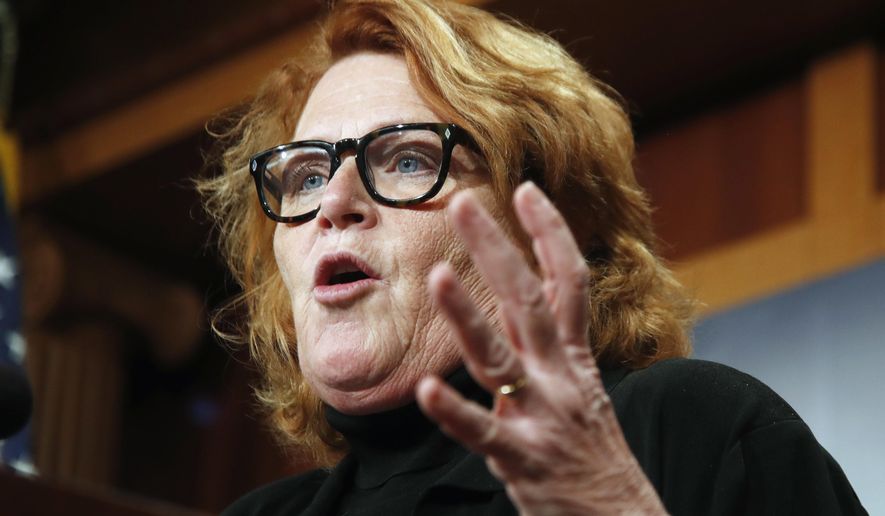Red-state Democrats seeking re-election this fall were already facing the difficult task of navigating between their own virulently anti-Trump national party and the Republican-leaning voters needed to win back home. But that narrow path has become even more of a tightrope now that incumbents will be asked to take sides on the president’s impending Supreme Court nomination.
Mr. Trump said he will move quickly to name a replacement for retiring Justice Anthony M. Kennedy, and Senate Republican leaders said they will vote on his pick this fall, brushing aside Democrats’ demands to wait until after the election.
If the Republicans hold firm, the Senate is likely to vote on a Supreme Court nominee just as the midterm campaign season hits full stride, after Labor Day.
It also means vulnerable Democrats in states such as West Virginia and North Dakota will have to choose between a president who easily won their states in 2016 and a frenzied liberal base intent on blocking anyone he chooses.
“This will become the defining issue in all of the contested Senate races,” said Chris Pack, spokesman for the Senate Leadership Fund. “It is a litmus-test vote for all red-state Democrats on whether they have President Trump’s back or not. Nothing else comes close.”
In the spotlight immediately are Sens. Joe Manchin III of West Virginia, Joe Donnelly of Indiana and Heidi Heitkamp of North Dakota — the three Democrats who broke with their party last year to vote for Mr. Trump’s first Supreme Court nominee, Justice Neil M. Gorsuch.
The three lawmakers met separately with Mr. Trump last week at The White House.
Others include Sens. Jon Tester of Montana and Claire McCaskill of Missouri, whose states Mr. Trump also easily won in 2016.
Mr. Trump is slated to hold a rally in Montana on Thursday.
Mr. Donnelly last week downplayed the idea that he is on the hot seat.
“I don’t worry about pressure,” he said.
Mr. Manchin released a statement saying he will give the nominee a fair shake but didn’t stop to answer questions from reporters late last week.
Mr. Manchin told a West Virginia radio station that he advised Mr. Trump during their meeting to nominate a centrist and cautioned against a nominee who would overturn Roe v. Wade.
“All that stuff is red flags for all Americans,” Mr. Manchin said. “Roe v. Wade has been the law for 40-something years.”
Ms. Heitkamp, meanwhile, kept a brisk pace as reporters chased her, signaling only that she would vet Mr. Trump’s choice.
One night earlier, Mr. Trump made sure that North Dakota voters were focused on the issue during a campaign stop with Rep. Kevin Cramer, Ms. Heitkamp’s Republican opponent.
“Heidi will vote ’no’ to any pick we make for the Supreme Court. She will be told to do so,” Mr. Trump predicted. “Democrats want judges who will rewrite the Constitution any way they want to do it and take away your Second Amendment, erase your borders, throw open the jailhouse doors and destroy your freedoms.”
Just hours after Justice Kennedy’s retirement announcement, the Judicial Crisis Network, a conservative pressure group, said it was buying airtime for ads on television and digital platforms targeting vulnerable Democrats.
One Nation, the issue advocacy arm of the Republican-associated Senate Leadership Fund, announced Thursday that it would be running online ads targeting Democrats on the pending Supreme Court vote in 10 states.
The first “SCOTUS” spot targeted Sen. Tammy Baldwin of Wisconsin, a state Mr. Trump narrowly won. The ad warns that the nation’s “freedom hangs in the balance” and that the “far left will stop at nothing to block President Trump’s choice.”
Republicans said the irony was that vulnerable Democrats would bolster their re-election chances if they sided with Mr. Trump.
Mike Braun, the Republican candidate in Indiana’s Senate race, predicted that Mr. Donnelly would end up voting for Mr. Trump’s pick in an attempt to pander to voters.
“Given that it’s an election year, I expect Sen. Donnelly to vote for President Trump’s nominee to distract from his liberal record of opposing tax reform, passing Obamacare and supporting Obama’s nuclear deal with Iran,” Mr. Braun said.
With a slim 51-seat Senate majority, Republicans have the votes to confirm Mr. Trump’s pick unless some Republican lawmakers get cold feet or look to send the president a message.
On Sunday, Sen. Susan M. Collins, Maine Republican, warned that she would refuse to support a Supreme Court nominee bent on overturning the landmark 1973 Roe v. Wade decision, saying such a position would violate respect for judicial precedent.
Democratic leaders are already making a play to persuade other centrist Republicans to break with Mr. Trump, and liberal activist groups have vowed to punish Democrats who side with Mr. Trump.
“We’re organizing Senate Democrats to FIGHT,” the Progressive Change Campaign Committee said in an email blast. “That starts with all of us showing them that their legacies will be forever based on their strength or weakness in this moment.”
Jim Dean, chair of Democracy for America, said voters are demanding that “Senate Democrats to do everything in their power to reject whatever anti-choice, pro-corporate, enabler of bigotry and hate Donald Trump and Mitch McConnell attempt to force onto the U.S. Supreme Court to replace Justice Kennedy.”
• Seth McLaughlin can be reached at smclaughlin@washingtontimes.com.




Please read our comment policy before commenting.